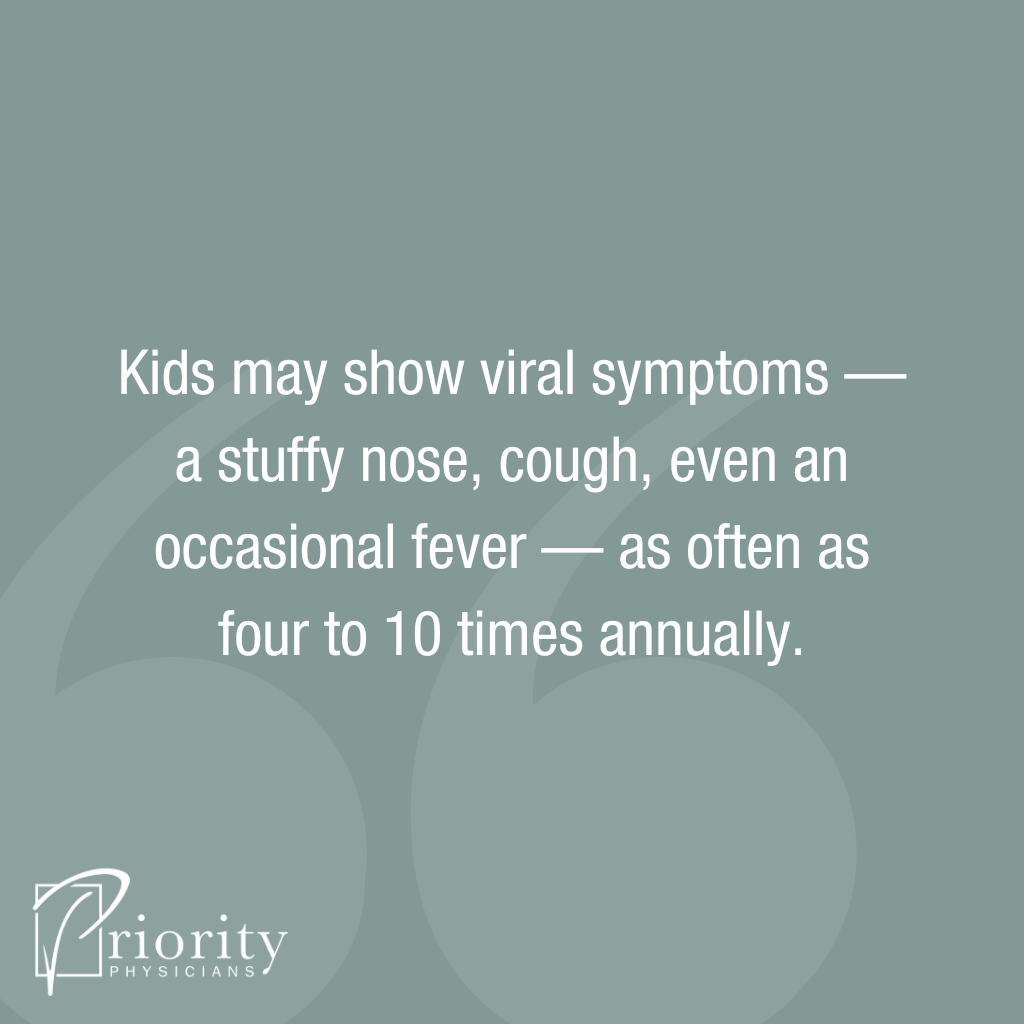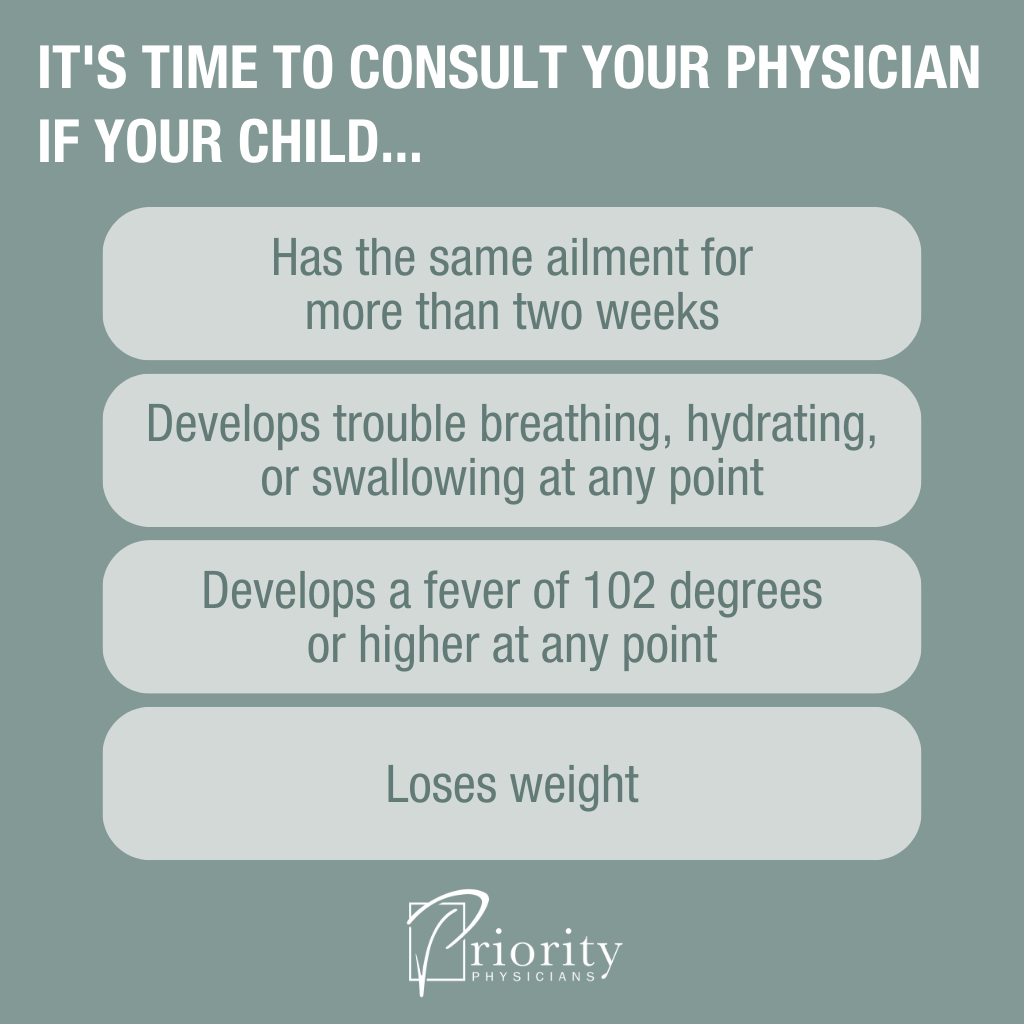You’re driving your six-year-old to school. Suddenly, from the back seat, you hear a sniffle. Then another, followed by a cough.
Could they be getting sick again? Didn’t we just do this last month?
If it seems like your kids are always coming down with something, you may feel uneasy about their overall health. Let’s look at how often children tend to pick up a bug or two, then review if and when it’s time to consult a physician.
Yes, Kids Tend to Get Sick Frequently
Worried that your child or children are frequently sick? This is a very common concern among the parents we see.
Kids in preschool and younger school-age children have immature immune systems, and their upper respiratory systems aren’t yet fully developed. Combine that with the fact that they’re just learning basic hygiene and are continually exposed to germs they’ve never experienced (often several pathogens at once), and you get the perfect setting for minor viral illnesses to take hold, on repeat.
For households with multiple kids, it’s even likelier that at least one child — sometimes several — will be sick at any given time.
How Often Is It Normal to Be Sick?
How often is too often for your child to be coughing, sneezing, or running a fever?
On average, as an adult, you can expect to be sick two to six times per year. But for kids, the norm is even higher: they may show viral symptoms — a stuffy nose, cough, even an occasional fever — as often as four to 10 times annually.
In other words, kids may be mildly sick, in total, for a couple months out of every year.
And there’s no question that the more kids in the house, the higher the infection rate for everyone in the household. In families with two children, a recent study shows that at least one person in the home will be sick for over half the year. With three kids or more, there will be at least one person sick for 80% of the year, a risk equivalent to regular daycare exposure.
Compare these numbers with childless households, where viruses are detected for only about 7% of the year.

When a Bug Strikes
Kids typically bring home more germs from October through April, thanks to school, indoor activities, seasonal weather, and temperature changes.
Help limit your kids’ exposure to germs by teaching them proper home hygiene, including how to wash their hands correctly. You can also help them avoid spreading germs by showing them how to sneeze and cough into a tissue or into their elbow rather than into their hands, and how and when to use hand sanitizer.
If your child does become sick, remind yourself not to stress over every little sniffle — chances are good that a cold or other minor viral infection will resolve itself in a few days without a visit to the doctor. Kids’ viral symptoms tend to peak at three days and typically fully resolve within 10–14 days.
In the meantime, ensure your child stays well hydrated and gets plenty of rest, particularly if a mild fever is present.
Be aware that most over-the-counter medications, especially those that promise multi-symptom relief, usually aren’t effective for kids. Trusted medications that may help your young patient feel more comfortable include acetaminophen (Tylenol) to help reduce fever in children two months and older, and ibuprofen (Advil) to help relieve inflammation in kids six months and up.
Your child may also feel better if you use a moisturizing saline spray or suction to treat their nasal congestion.
Trust Your Gut
If your child seems to be sick too frequently, you may be concerned that their immune system is somehow compromised. Or you might wonder if an environmental factor is causing or aggravating their illness — such as common irritants like pet dander, mold, or chemical fumes from paint or cleaning products.
So, when is it time to check in with a physician about your child’s illnesses?
The average child bounces back quickly from those two to 10 bugs a year. But be alert to an illness that lingers indefinitely or gets progressively worse.
If your child seems to move from illness to illness without ever getting truly well between bouts, it’s time for your physician to step in. Trust your gut ─ recovery and reinfection are normal; failure to recover isn’t.
You’ll also want to consult your physician if your child:
- Has the same ailment for more than two weeks
- Develops trouble breathing, hydrating, or swallowing at any point
- Develops a fever of 102 degrees or higher at any point
- Loses weight
Document when your child started feeling sick, as well as the progress of their symptoms day by day. Note whether a parent has traveled lately, or whether the child attends school/daycare or has recently visited other family members.

The Takeaway
At Priority Physicians, we respect and rely on a parent’s intuition. The goal of concierge medicine is to have an ongoing, personalized relationship with your family, one where we can devote immediate attention to investigating and resolving your concerns.
If your child experiences unusual or prolonged symptoms, or is feeling extremely uncomfortable, we’re standing by to help.

